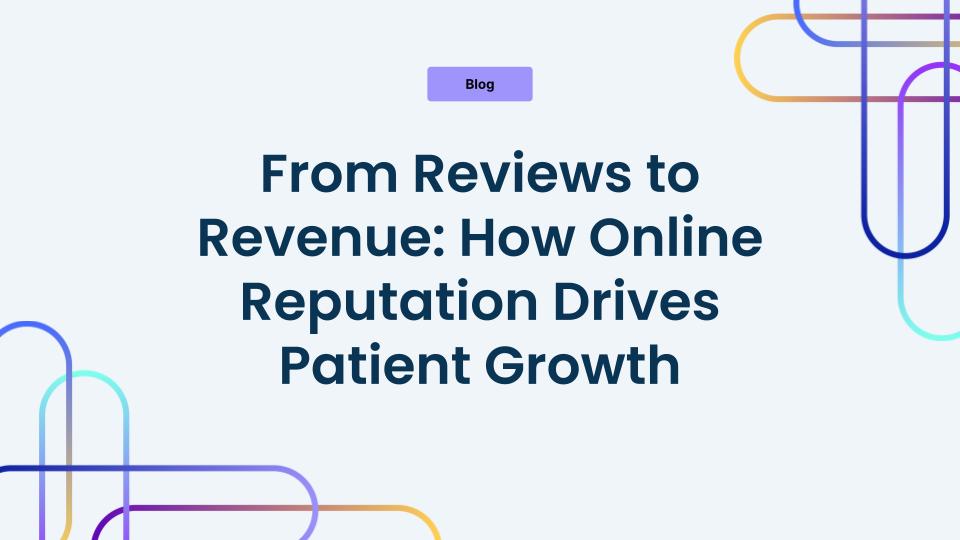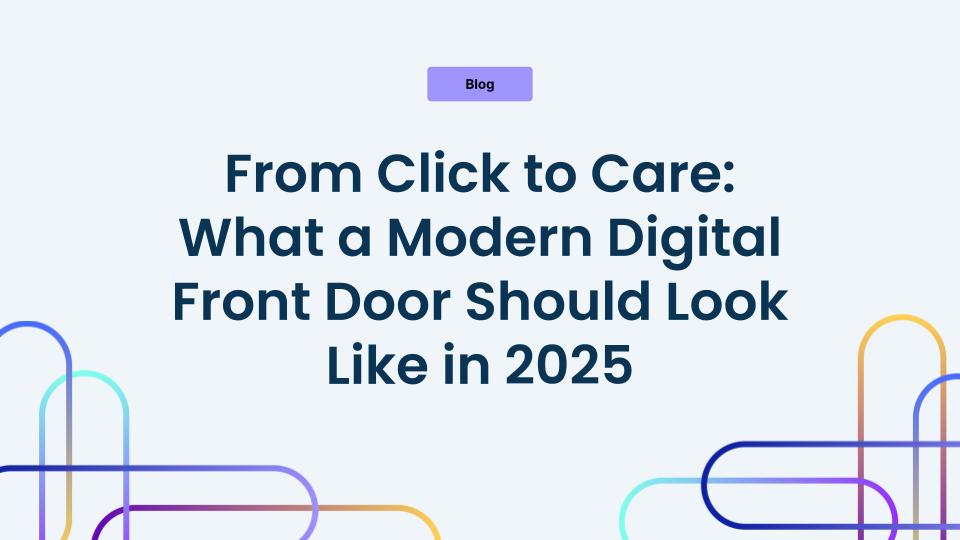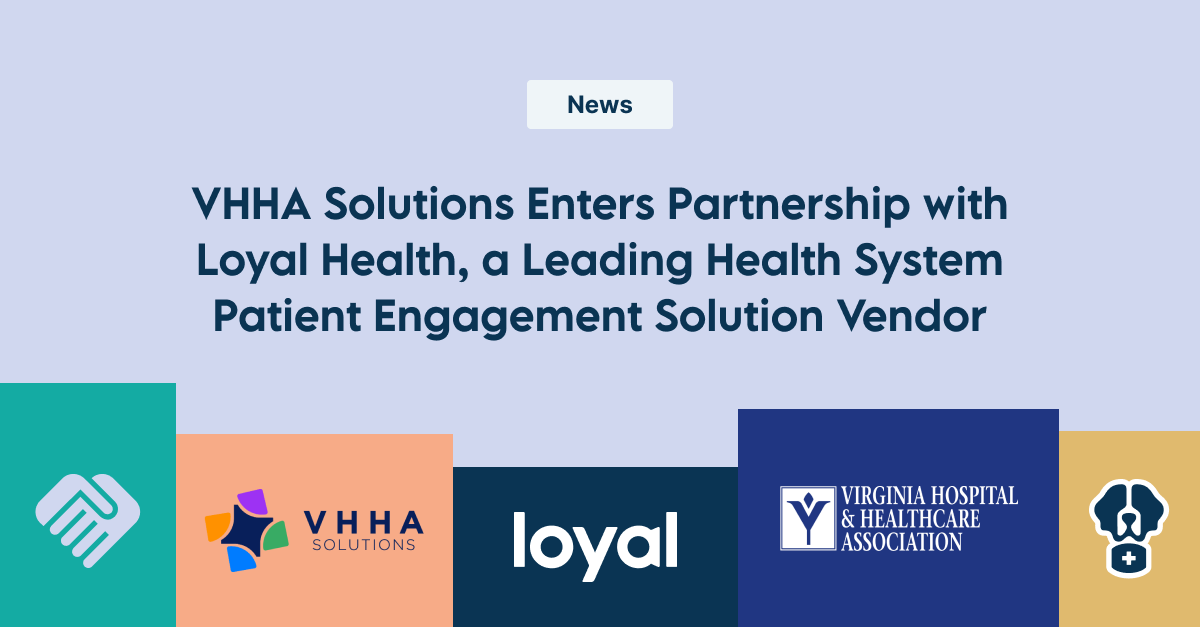Healthcare has become one of the most competitive industries as hospitals and health systems vie for patient loyalty and satisfaction in a dynamic and evolving market. With the rise of consumerism in healthcare, patients now have more choices than ever, demanding convenience, ideal experiences, and personalized care paths.
Patient engagement solutions and protocols have become a powerful differentiator, allowing health systems to stand out by offering personalized experiences at scale. By integrating tools that facilitate real-time communication, personalized outreach, and self-service options, health systems can create more positive and tailored patient journeys. These systems not only improve patient satisfaction but also increase appointment volume and service utilization, leading to higher revenue and stronger patient retention for long-term growth.
In a landscape where patient experience is increasingly linked to reputation, revenue, and market share, health systems that effectively leverage patient engagement solutions will have a distinct competitive advantage. In this blog, we’ll explore the key patient engagement and experience trends that health systems need to consider in 2025.
- EHR Integrated Engagement Platforms
- Bi-directional, electronic health record (EHR)-integrated engagement tools have the ability to transform patient engagement workflows. Pairing these tools allows health systems to enhance segmentation by analyzing a vast array of patient information, including demographics, medical history, treatment responses, and social determinants of health (SDoH). As a result, they can craft highly personalized experiences that address each patient’s specific needs and preferences. This level of customization enables health systems to engage patients with highly personalized, timely, and relevant communication, ultimately contributing to sustained revenue growth and market expansion.
- Centralized Provider and Location Data
- Ensuring patients can easily access accurate, up-to-date information on healthcare professionals, facilities, and services requires a modern, centralized data management solution. When provider and location data are fragmented or outdated, it can lead to significant challenges, including poor patient engagement experiences and increased administrative burdens on healthcare staff. These inefficiencies frustrate patients seeking timely care and can result in financial losses through missed appointments and diminished trust. A well-maintained centralized provider data management system serves as a comprehensive repository that enhances patient access by providing real-time information on providers’ specialties, availability, and service offerings. Its accuracy reduces the likelihood of errors, improves patient and staff experiences, and supports informed decision-making, ultimately transforming the patient experience and healthcare delivery.
- Integrated Feedback Systems
- Patients have a voice in their care experience, making real-time feedback collection essential. Hospitals that embrace real-time patient feedback systems unlock invaluable insights into the quality of their services and the satisfaction of their patients. By programmatically collecting and analyzing feedback at critical touchpoints—such as during admission, treatment, discharge, or transfer—healthcare systems can swiftly identify positive trends and address emerging concerns. This proactive approach enhances operational efficiencies and builds a solid foundation of trust between providers and patients. A commitment to improving a health system’s feedback system will also establish a continuous improvement culture, ultimately leading to improved patient satisfaction, loyalty, and retention.
- Omnichannel Communication
- Patients increasingly expect to interact with their healthcare providers in ways that align with their preferences and lifestyles. This includes scheduling appointments, receiving reminders, and asking questions. By centralizing communication through an omnichannel platform, health systems can enhance accessibility, improve patient satisfaction, and decrease the chances of missed appointments or delayed care. This approach also strengthens the relationships between patients and providers, improves care coordination, and boosts operational efficiency. Ultimately, it builds trust and loyalty, encouraging repeat visits and referrals, which contribute to sustained revenue growth and market expansion.
- Interoperable Engagement Solutions
- Adopting an interoperable approach when integrating engagement tools is essential for enhancing the effectiveness of healthcare systems. By enabling these systems to communicate seamlessly, healthcare providers can create personalized experiences that cater specifically to the unique needs of patients. For instance, personalized health risk assessments can leverage patient data—such as medical history, lifestyle choices, and genetic information—to identify potential health risks and recommend targeted interventions. Automated appointment reminders, which can be sent via SMS or email, significantly reduce the likelihood of missed appointments and improve overall attendance rates. Additionally, optimal scheduling options can help minimize wait times while accommodating patients’ preferences and availability. Health systems prioritizing such personalization strategies can expect an increase in positive patient reviews and satisfaction, leading to enhanced patient loyalty and retention.
- Advanced Data Enablement
- An effective data management and enablement strategy allows for the collection and integration of data from various sources, such as electronic health records, customer relationship management systems (CRMs), claims, social determinants of health (SDoH), and more. By leveraging advanced analytics and artificial intelligence, healthcare systems can create more detailed patient segmentations, enabling personalized and timely communication that meets individual needs and preferences. This approach enhances the patient experience while improving appointment adherence, service utilization, patient retention, and resource allocation. As consumer expectations for personalized healthcare interactions continue to grow, data enablement will be essential in fostering meaningful engagement and patient experiences.
- Patient Activation
- Creating a data-driven and scalable patient activation strategy is essential for increasing care utilization and driving revenue growth. As competition intensifies and patient expectations for convenience rise, health systems must utilize digital tools, predictive segmentation, and personalized messaging to enhance their activation strategies. Implementing tactics such as online scheduling, AI-driven chatbots, automated reminders, and proactive outreach based on patient histories and care needs can minimize friction and encourage timely appointments. By focusing on patient activation, health systems can improve operational efficiency, close care gaps, and enhance patient retention, strengthening their position in the market.
As the healthcare landscape becomes increasingly competitive, patient engagement tools have transformed from optional features to essential solutions for health systems aiming to stand out from their competitors. These engagement and experience solutions not only enhance patient satisfaction for health systems but also improve conversion rates, optimize resource allocation, and improve their overall financial performance.
——————————————————————————————————————————
Interested in expanding your engagement capabilities? Loyal offers a suite of engagement solutions that augment the entire patient experience—from provider search and scheduling to personalized outreach. With real-time EHR integration, Loyal reduces administrative burdens while enabling efficient, automated patient engagement. Tailored specifically for healthcare, Loyal’s platform delivers an intuitive, industry-specific solution with a focus on fast implementation, minimal IT burden, and quick ROI. Schedule time with our team here to learn more about our configurable set of engagement solutions.




